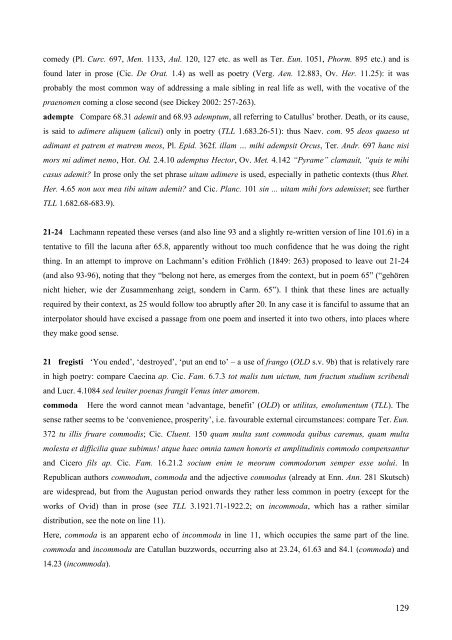CATULLUS 68 - Scuola Normale Superiore
CATULLUS 68 - Scuola Normale Superiore
CATULLUS 68 - Scuola Normale Superiore
Create successful ePaper yourself
Turn your PDF publications into a flip-book with our unique Google optimized e-Paper software.
comedy (Pl. Curc. 697, Men. 1133, Aul. 120, 127 etc. as well as Ter. Eun. 1051, Phorm. 895 etc.) and is<br />
found later in prose (Cic. De Orat. 1.4) as well as poetry (Verg. Aen. 12.883, Ov. Her. 11.25): it was<br />
probably the most common way of addressing a male sibling in real life as well, with the vocative of the<br />
praenomen coming a close second (see Dickey 2002: 257-263).<br />
adempte Compare <strong>68</strong>.31 ademit and <strong>68</strong>.93 ademptum, all referring to Catullus’ brother. Death, or its cause,<br />
is said to adimere aliquem (alicui) only in poetry (TLL 1.<strong>68</strong>3.26-51): thus Naev. com. 95 deos quaeso ut<br />
adimant et patrem et matrem meos, Pl. Epid. 362f. illam … mihi adempsit Orcus, Ter. Andr. 697 hanc nisi<br />
mors mi adimet nemo, Hor. Od. 2.4.10 ademptus Hector, Ov. Met. 4.142 “Pyrame” clamauit, “quis te mihi<br />
casus ademit? In prose only the set phrase uitam adimere is used, especially in pathetic contexts (thus Rhet.<br />
Her. 4.65 non uox mea tibi uitam ademit? and Cic. Planc. 101 sin ... uitam mihi fors ademisset; see further<br />
TLL 1.<strong>68</strong>2.<strong>68</strong>-<strong>68</strong>3.9).<br />
21-24 Lachmann repeated these verses (and also line 93 and a slightly re-written version of line 101.6) in a<br />
tentative to fill the lacuna after 65.8, apparently without too much confidence that he was doing the right<br />
thing. In an attempt to improve on Lachmann’s edition Fröhlich (1849: 263) proposed to leave out 21-24<br />
(and also 93-96), noting that they “belong not here, as emerges from the context, but in poem 65” (“gehören<br />
nicht hieher, wie der Zusammenhang zeigt, sondern in Carm. 65”). I think that these lines are actually<br />
required by their context, as 25 would follow too abruptly after 20. In any case it is fanciful to assume that an<br />
interpolator should have excised a passage from one poem and inserted it into two others, into places where<br />
they make good sense.<br />
21 fregisti ‘You ended’, ‘destroyed’, ‘put an end to’ – a use of frango (OLD s.v. 9b) that is relatively rare<br />
in high poetry: compare Caecina ap. Cic. Fam. 6.7.3 tot malis tum uictum, tum fractum studium scribendi<br />
and Lucr. 4.1084 sed leuiter poenas frangit Venus inter amorem.<br />
commoda Here the word cannot mean ‘advantage, benefit’ (OLD) or utilitas, emolumentum (TLL). The<br />
sense rather seems to be ‘convenience, prosperity’, i.e. favourable external circumstances: compare Ter. Eun.<br />
372 tu illis fruare commodis; Cic. Cluent. 150 quam multa sunt commoda quibus caremus, quam multa<br />
molesta et difficilia quae subimus! atque haec omnia tamen honoris et amplitudinis commodo compensantur<br />
and Cicero fils ap. Cic. Fam. 16.21.2 socium enim te meorum commodorum semper esse uolui. In<br />
Republican authors commodum, commoda and the adjective commodus (already at Enn. Ann. 281 Skutsch)<br />
are widespread, but from the Augustan period onwards they rather less common in poetry (except for the<br />
works of Ovid) than in prose (see TLL 3.1921.71-1922.2; on incommoda, which has a rather similar<br />
distribution, see the note on line 11).<br />
Here, commoda is an apparent echo of incommoda in line 11, which occupies the same part of the line.<br />
commoda and incommoda are Catullan buzzwords, occurring also at 23.24, 61.63 and 84.1 (commoda) and<br />
14.23 (incommoda).<br />
129






